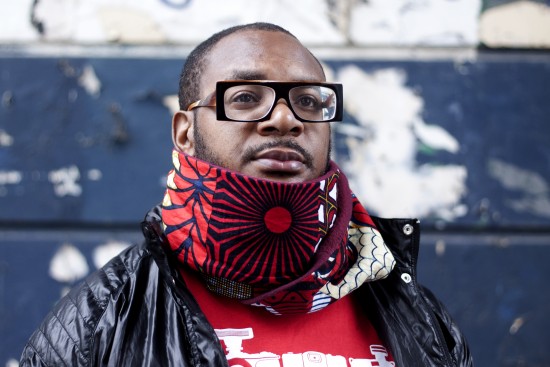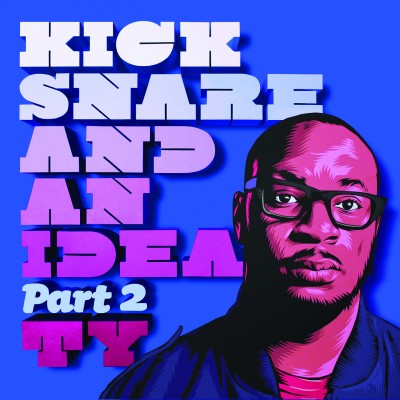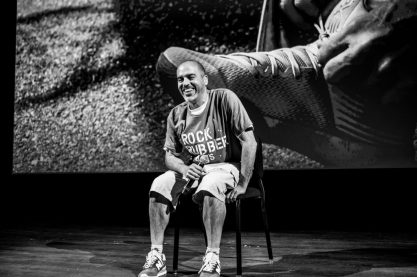Interviews
GET TO KNOW: Ty - Kick Snare And An Idea
One of the most respected and celebrated rappers in the UK, Mercury Prize-nominated, Ty, has launched a new project that is breathing new life into the UK hip-hop scene.
Hailed by DJ Mag as “UK’s most well-rounded rap don,” Ty is a seasoned producer who’s already worked with several music heavy weights as Tony Allen, De La Soul, Arrested Development and Talib Kweli.
As with his previous albums, he has brought in music talents from different genres, like soul singers Sharlene Hector and Joy Jones and jazz musicians Richard Spaven and Jason Yarde. But name dropping aside, Ty stands on his own merits of having built a solid, loyal international fan base who know him for his quality beats and honest, engaging lyrics depicting everyday life.
Now signed to Tru Thoughts, label home to artists like Alice Russell, Quantic and Mark de Clive-Lowe, Ty takes a very personal, hands-on approach to every aspect of his latest EP - with regards to the collaborations, the production, the marketing, the promotion, even his live shows.
Just by listening to “Like You Never”, it’s apparent that Ty bears a generous sense of responsibility. He’s somewhat of a teacher, a coach or even a big brother - a fiercely supportive but no-nonsense character. To watch him in action is not only surprising in this industry, it's actually quite humbling. Rather than distancing himself from his audience, he brings them even closer, maintaining an open channel to fans and fellow music makers alike.
During a chat with Couch Sessions in the antique filled rooms of South London’s Brunswick House, Ty tells us how he is keen to share his platform with kindred spirits; how he's embracing change while proudly holding steadfast to life long principles.
Based on artistic freedom, creative pride and camaraderie, Ty is building a village. And “unlearning” is integral to that whole dynamic.
How did you come up with the concept for Kick Snare And An Idea?
I wanted to do an EP with fewer songs. I felt like people weren't listening. People listen to maybe two records. The last album Special Kind of Fool on BBE, had 14, so with this EP I have five. I’d rather have two, three, four records that I listen to intensely and my fans enjoy. That’s how I was working, so I made the EP. And then Tru Thoughts came along and said, “Ty, we really want to work with you. But we want an album. But because we want an album, we’ll release your EP just to show you you’re in good hands.”
And with this new EP, I let the label know there’s three people in this relationship – me, the label and the fans, and we have to include them.
The attention to detail that’s reapplied to music - to the mixing, the creation - is being applied to the marketing and the promotions. It’s been really interesting. It’s like art again. I’m seeing art in all the stages – with regards to the videos with Bunny Bread and Alex Winn; Tru Thoughts working with Record Breakin' to do the vinyl; the way we’re promoting stuff; the way the audience is promoting the records on BB6 Music, MTV Base. I’ve not seen this before. In all the years I’ve been doing it, I haven’t seen this level of camaraderie between different fellowships.
Speaking of your fans, it was a lot of fun the way you included your audience, as well as other acts, in your Jazz Cafe launch party.
The Jazz Café show was more about being in control as an artist with regards to the venue and being booked to do a launch. I’m gonna create a platform so that people who enjoy what I do have the opportunity to enjoy others.
I’m never gonna survive as an artist if I think it’s all about me musically all the time. There needs to be a volume of quality work for people to be interested in outside of yourself to create a scene. And that’s what I did with that show. There are couple interesting people that I really feel like I want them in my front room. What I wanted on my platform was for people to see them and say, “These people are really good.”
Let’s be in a packed house, see what goes down and have some fun.
I come from an African village perspective. That’s how I like to see things for people. My heritage plays a role in how I work with people. This is a village community thing. That was the vibe.
You also do a lot of collaborations with different types of artists.
My music often has someone guest musically, but often collaborations are only taken in the context of the artists, not the musicians. Some people were suggesting that you can’t hold your own. Like, you need all these people to make your stuff interesting. So we did something different with this record. This time, we changed the package and we saw a great response. “Like you Never” could’ve said, featuring Sharlene Hector. “Let’s Start” could’ve said, featuring Akwasi Mensah or featuring Harry Love, or "Well, Well, Well" features Amp Fiddler. We took that away. To find that out you’ve got to read the label, read the credits, and just listen to the song.
It’s been 10 years since your Mercury-nominated album Upwards. Do you feel you’ve changed a lot as an artist since then?
Always changing, and the climate is different. And the motivation is always gonna change every day with regards to the themes, the motive for making music, the motive for writing songs. At the same time, the principles have always been the same. Snapshot - this is life right now. Snapshot – I’m gonna write about her back. I’m gonna talk about that glass on the table. I’m gonna talk about that mark on the floor. This is how I’m feeling today. This is what I’m seeing today.
Every song has a day attached, has a feeling attached, and has a background. With “Wait a minute” I had just broken up with my girlfriend and the song came along and I saw the melodies and it was like, “Wait a minute we’ve got some problems. Wait a minute let’s think this through.” At that time I was trying to get her to call me back to have a conversation, and so it’s just real life attached to a song. It’s always been that.
Some people say to me, “You’re a conscious rapper.” No, I don’t like that at all. It belittles what I’m doing. I’m doing something else. I’m changing the dynamic of Superman and Clark Kent. It’s Clark Kent with a cape – that’s the real Ty. The musician is just an amplification of the regular guy. That’s what it is and what I’m trying to push along.
What do you think about the UK hip-hop scene at the moment?
It’s been quiet and subdued, beaten into submission. It was hard for hip-hop to be cool over the last 10 years, with dubstep, grime. All these different styles of music giving that mainstream feel. Other music is being made more trendy. It all comes down to audiences thinking it’s not relevant. They get controlled by what gets played on the radio or what is not played. We’ve suffered being left outside for a while. But it’s been a blessing in disguise because people have to pick themselves up.
But what I’m seeing now is a rebirth, a new energy with the new artists – Logic, Akala, Breis, AKS. Loads of people are doing really good things. I’m watching that, part of it, proud of it.
What’s more important is that folks have to understand what’s working in it. There is an awakening in the music, but there needs to be an awakening in the way people treat the artists and in the way the artists conduct themselves. It’s very important now to break the mould with regards to thinking about the music they’re making, the things you’re saying and the way you go about promoting yourself. Don’t rely on the old system. Technology is changing, opportunities are changing, therefore breakthroughs are inevitable and close by.
The “Like you Never” video starts with you teaching in a classroom full of kids. Was that a real life scenario?
In the video we had a classroom being taught DJing by Motet and Sean Armstrong. I was teaching in another room, in another building. We were working on hip hop and rapping and writing and poetry and working on people’s writing and getting them to be able to express themselves. We were there in Aruba for two weeks to create a show and also to kickstart some fire with regards to creative pride in rapping, in poetry, in spoken word. Not saying it didn’t exist there. But we wanted to get some people who were really passionate about it and do loads of workshops.
My thing with workshops is to leave a legacy. There are life lessons in the arts that you can work with that you can enhance your communication in everything.
There are a couple of lines that I always say like, “The floor is not your friend.” That’s a phrase I like to use that when you’re talking. Looking at the floor is absolutely not cool. It doesn’t help to convey a message. If you don’t look at people’s eyes, if you swivel, you’re not imparting shards of energy to them, you’re not really communicating.
I’m teaching them things like - first impressions really count. You’re setting up a relationship with the listener where they have to pay attention because you’ve shown – hey, I’m not invisible. There’s loads of things that they can take away and utilize outside of class.
You started a Facebook group called Beat Inn. Could you talk a bit about that?
Beat Inn is about people interested in listening and making beats. It’s gone worldwide with nearly 2000 members. It’s a movement and a culture. Like with Kick Snare And An Idea, I wanted to push a code name, a title that described a culture for people who make beats. Sometimes that’s all we have - keys, sample, chop.
We place the sampling, then people do what they want to do to it. You can hear music that people are making that hasn’t yet reached a DJ or a label. There’s a soundcloud page of all the members and people get lost. You can create a playlist of music that no DJ is playing.
I like the idea that you create your taste. You say - I like that, nobody told me to like that. I’m trying to encourage that type of individualism because DJs these days seem to have the control of the playlist, but they’re not as free as they should be. But I want to see that freedom on the dance floor, behind the DJ booth. I want to see that freedom behind the eyes of anybody that wants to create art.
And for me freedom means you have to "unlearn". That’s the biggest word for me this year - unlearning. My view of Africa, I have to unlearn it. You have to unlearn the things that normally let you be comfortable in not doing something.
Kick Snare And An Idea Part 1 is out now on Tru Thoughts with the vinyl available at Record Breakin'. Kick Snare And An Idea Part 2 will be released on June 11 in the United States, June 10 in the UK and the rest of the world.


